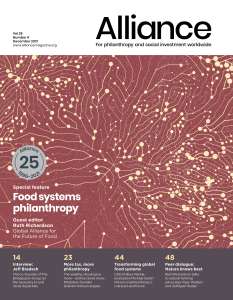For many years, agriculture was the poor cousin of climate philanthropy. The European Climate Foundation’s land-use programme is an indication of how this has changed.
When the ECF was set up, in 2008, its focus was very much on the decarbonization of the energy system. Even though food and agriculture contribute between ten and thirty per cent of global greenhouse gas emissions, depending on how you count them, the sector was conspicuously absent from the ECF’s portfolio. Apart from its work to limit the use of bioenergy, like first-generation biofuels, that competes with food and nature, the ECF, like many other climate philanthropies, did not really address land.
There were good reasons for this. Agricultural reform was deemed too complex, too politically entrenched and dealing with too many small actors. Its role in climate mitigation was seen as marginal, partly because its own emissions were obscured by accounting practices—so the carbon footprint of fertilizer production or the transport of agricultural goods was assigned to other sectors. And in the pre-Paris Agreement era, when the EU’s emission reduction target was usually described as 80-95 per cent below 1990 levels, it was possible to argue that agriculture could lay claim to that residual share.
But it is increasingly clear that we can no longer afford to leave the agricultural sector out of the equation. This is not just because getting to net-zero emissions means involving every sector. It’s also because agriculture has a special role to play in climate action. Agriculture (as well as forestry) is particularly exposed to the impacts of climate change, as rising temperatures will ravage currently fertile areas.
Agriculture is also part of the solution. By reducing consumption and production of carbon-intensive foods like meat and dairy, and by shifting to a more nature-friendly farming system, one that works with natural systems rather than relying on massive inputs of energy, pesticides and fertilisers, we can address agriculture’s greenhouse gas footprint while helping nature restore itself.
There is also a tremendous political opportunity in Europe that philanthropy can seize. For years, the Common Agricultural Policy has funnelled subsidies—almost €60 billion per year—into a particular kind of intensive, export-oriented farming, focused on monocultures and specialisation. The kind of farming we have optimized for in Europe is a relic of a post–World War II mentality, dominated by a narrative of food security and politically insulated change due to the importance of the farming vote. Now, the European Green Deal provides a new framing, in the Farm to Fork policy: food production is just one goal alongside healthy diets, rural development, social justice and environmental protection.
Agriculture has a special role to play in climate action. It is particularly exposed to the impacts of climate change, as rising temperatures will ravage currently fertile areas.
The EU is in the final stages of adopting a new CAP, which will be in place to 2027. This CAP has some positive new elements, such as somewhat higher environmental standards and safeguards for farmworkers, but its origins are in the Commission’s proposal from 2018, before the massive climate strikes of 2019 reasserted climate change in the public’s imagination and the new Commission, in 2019, adopted the European Green Deal.
But the real opportunity lies in the next five years, leading up to the adoption of the next CAP in 2027. This will be a hard political fight, and one that needs to be fought not in the corridors of the EU Institutions in Brussels but on the ground in the EU Member States. Over the next few years, the ECF and its partners will support the development of nascent national movements for long-term CAP reform. These movements will be different in each target country, but they will all need to bring new voices to the debate, to level the playing field of agricultural policy so that voices for change are not drowned out by the forces of the status quo, and to show that reform is essential not just for the climate but also for nature, livelihoods and wellbeing.
Porticus is one of the philanthropies that has recently stepped into the field of European agriculture. Recognizing the opportunities of the coming decade, Porticus supports the ECF’s work on agricultural reform. Together, ECF and Porticus are joining forces with other foundations organized as the European Foundations for Sustainable Agriculture and Food (hosted by the European Foundation Centre), and build on the efforts of other foundations like Fondation Carasso and the Heinrich Böll Foundation, which have been pushing for CAP reform for almost a decade. It will work alongside new initiatives like the Healthy Food Healthy Planet initiative, which is focusing on changing the ‘food environments’ in Europe. These efforts add up to an exciting proposition: that philanthropy is ready to turn its considerable resources to transforming the European food system.
Thomas Legge is Director of the European Climate Foundation’s land use programme, Trees Robijns is Programme Manager in the ECF’s land use programme, and Hugo Hooijer is Global Programme Manager at Porticus.
Correction 10 November: An earlier version of this story incorrectly stated that the subsidies from the Common Agricultural Policy for industrial farming totalled €60 million per year. The actual figure is €60 billion per year.
 Upcoming issue: Food and philanthropy
Upcoming issue: Food and philanthropy
Philanthropy spends billions on areas that are implicitly connected to food systems such as environment, climate, health, nutrition, and development but food issues are seldom explicitly addressed in funding strategies. Did 2021 prove to be the year when all that changed? This issue explores the ways in which philanthropy can help translate commitments made at the UN Food Systems Summit and COP26 into action and sets out a critical role for philanthropy in the future of food. Guest edited by Ruth Richardson, Executive Director of the Global Alliance for the Future of Food.
Subscribe today to make sure not to miss it!







Comments (1)
You've shared some incredibly useful information. This is frequently a terrific way for us to broaden our knowledge while remaining useful. Thank you for bringing this article to our attention. Agriculture Information